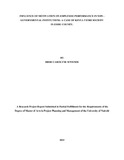| dc.description.abstract | Motivation is one of the many factors that contribute to employee performance. It is the force
that drives employees‟ behaviour to produce a certain output. Job performance is the ability of an
employee to integrate skill, experience, knowledge, and other available resources in delivering
the expected outcome. Various studies have concluded that there are a number of factors that
contribute to employee performance. Management standards, level of commitment, the
knowledge of work, communication, and motivation and employees skill are just a few of these
factors. With a clear and attractive motivating factor, employees gear all their efforts towards
achieving the set goals working through any challenges faced in the process. Motivated
employees use their creativity to find solutions to challenges which leads to the invention we see
today. This study sought to investigate how various motivating factors influence employee
performance. Motivation has been recognized globally with the International Labour
Organization discussing it in many of their conferences. The government of Kenya has also
taken initiative to create a motivated, well trained and globally competitive labour force to
ensure maximum productivity and proper service delivery by the public service sector. This has
been incorporated in the Kenya vision 2030. The constitution of Kenya 2010 has also outlined
the core values to be observed by each public servant. Literature review incorporated what other
scholars found out to shed light on how compensation, promotion, supervision, and recognition
influence performance. The scope of the study was limited to Embu County. The study adopted a
descriptive research design. The target population of the study was employees of Kenya Tenri
Society, Embu County. The Society has several institutions; however the study sampled only
four which are within the county. The study was carried out by use of questionnaires which were
administered to the respondents. Their responses have been analyzed to reach conclusions. The
data for the study has been analyzed by use of Statistical Package for Social Sciences (SPSS) and
through frequencies, percentiles tables and Pearson‟s co-efficient correlation. . The objectives of
the study were; to establish the influence of compensation on employee performance, to
determine the influence of promotion on employee performance, to assess the influence of
recognition on employee performance and examine the influence of supervision on performance
among the employees of Kenya Tenri Society. Findings from the study confirm that a significant
association exists between employee motivation and employee performance. In conclusion, all
four independent variables assessed in the study showed a significant level of association with
employee performance. It is therefore recommended that NGOs need to Develop and implement
a payment policy to attract sufficient and suitable employees, come up with a clear promotion
and career advancement policy, develop an organizational structure to communicate to
employees on different levels of authority and enhance employee recognition with a financial
reward. Since the NGO sector plays a significant role in developing countries the study provides
more knowledge on factors that affect employee performance in the sector. | en_US |

